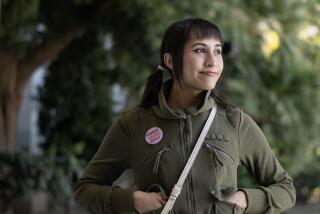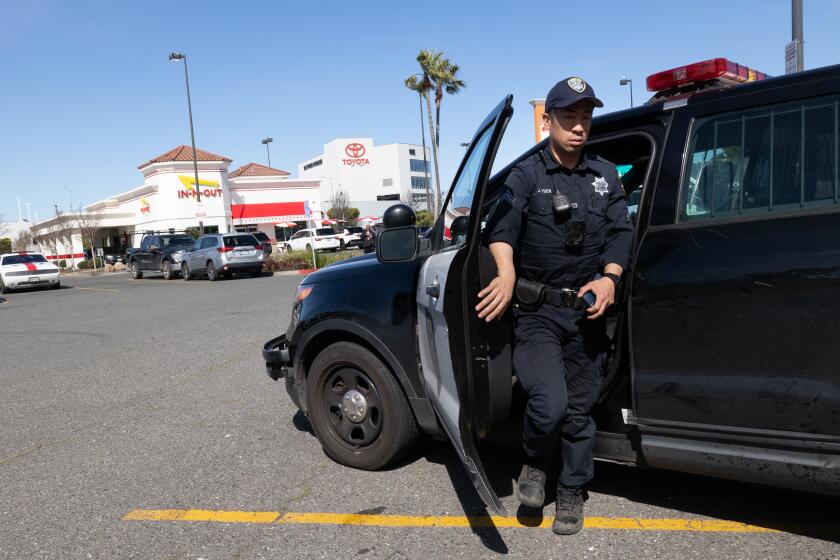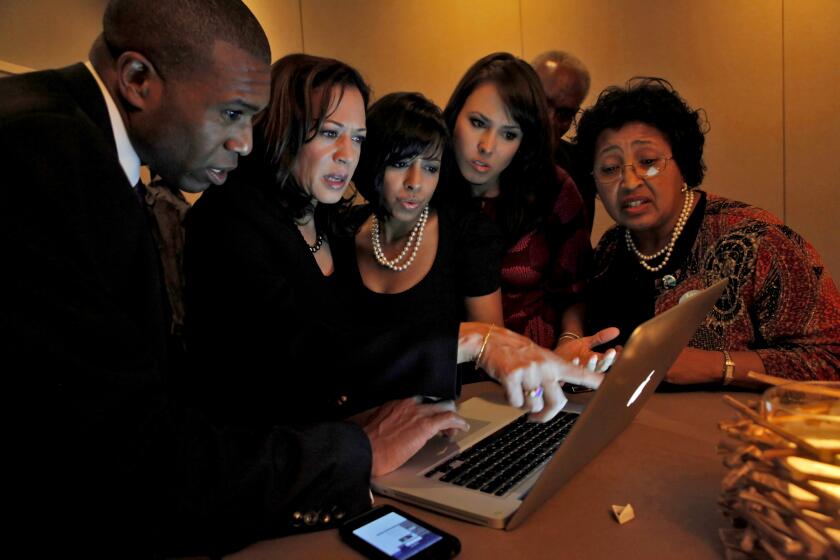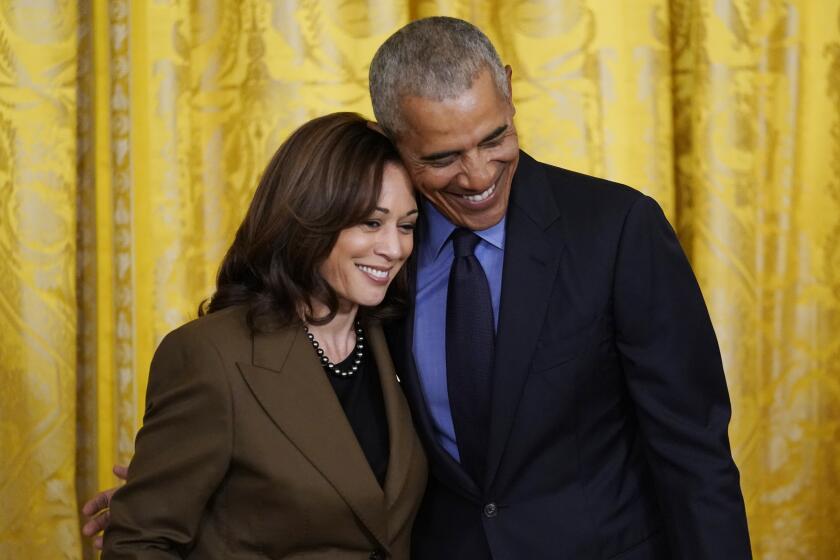NAACP Says Recall Backers Were Badgered
A local officer with the National Assn. for the Advancement of Colored People claims that black voters in Oceanside were intimidated by supporters of Oceanside City Councilwoman Melba Bishop because they signed the petition calling for her recall from office.
At least a dozen recently registered voters complained that they were “intimidated” and “harassed” by political workers who asked them to change their mind about the recall, said John Carter, president of the North County branch of the NAACP.
“People who registered to vote (in recent months) were asked if they signed the recall petition--but it’s none of their business,” Carter contended. “The problem was, some of these (voters) are not strong-willed enough and felt obligated to answer.
“Now, some of these people are really concerned,” he said. “They figure, if it can be found out that they registered to vote, maybe it can also be found out how they’ll vote. You and I know that’s not possible, but these are people who maybe never voted before, and now they’re apprehensive about going to the polls. That’s an outrageous situation. That’s the same conduct that was occurring in the 1960s.”
Supporters of Bishop acknowledge that they contacted hundreds of recently registered voters in Oceanside to ask if they would consider withdrawing their names from the recall petitions.
But the anti-recall campaign involved no heavy-handedness, said Dixie Bales, who heads Citizens for Honest Government, which supports Bishop.
At issue was the petition signature drive that culminated in June with enough names to force Bishop, a longtime on-and-off-and-on-again member of the Oceanside City Council, to face a recall election in October. Critics claim that Bishop and her two council colleagues, Don Rodee and Nancy York, have turned city government upside down with their newfound majority power.
Even as the signature campaign was under way to force the recall election, Bishop forces were trying to negate it by contacting newly registered voters and asking them to withdraw their names from the petition--if they had signed it--before it was turned in, Bales said.
A person who signs a petition for a recall can change his mind and have his name stricken from the petition if he signs the appropriate form before his signature is turned in to the county recorder’s office, she noted.
Given that, she said, Bishop supporters contacted persons who registered to vote in Oceanside after Jan. 1, with the assumption that many of them were registered to vote by Bishop recall proponents who then got them to sign the recall petition.
Rodee, who wanted the new names to supplement his own list of previously registered Oceanside voters, purchased the list of 2,812 newly registered voters from the county, for $48.69, and then loaned it to Bales’ group, he said.
Armed with those names, Bales said, she and half a dozen others--including Rodee himself--contacted as many of the new voters as they could, and asked them if they had signed the recall petition. If they acknowledged that they had, she said, they were then asked if they would change their mind and sign another form that would remove their name from the original petition.
Their hope, she said, was to cut into the number of recall signatures and nip the recall effort in the bud.
Even before the recall proponents had turned in the names of more than 8,000 persons asking for Bishop’s recall, Bales’ group collected the names of 398 persons who said they had signed the recall petition but had now changed their minds.
By the time the dust settled and both camps’ names were turned in, the recall drive had 161 names more than necessary to force the recall election.
Carter of the NAACP said he was contacted by about a dozen voters who complained of the tactics. “This conduct has greatly intimidated many of the citizens, even to the point of being apprehensive about going to the polls on election day,” Carter wrote to Oceanside Mayor Larry Bagley.
Carter then aired his complaints publicly at the Oceanside City Council meeting Wednesday. Carter also asked the district attorney’s office to look into the matter, and district attorney’s spokeswoman Linda Miller said investigators are awaiting documentation to pursue it.
Bagley said he had no general complaint about a political camp approaching voters. “That’s been done historically,” he said. “But, if people say they’ve been intimidated and harangued, then that’s going too far. There’s a difference between getting people to vote a certain way, and trying to persuade them to take their name off a document that they’ve already signed.
“You may be dealing with people who are unsophisticated, who have finally registered to vote, and now they’re on the list and suddenly they’re getting contacted. That can be intimidating to them.”
Bales said her anti-recall efforts took her and half a dozen other Bishop supporters to the homes of several hundred newly registered voters.
“The people who got the names for the recall petitions are professional signature gatherers, who are hired by recall people to come into town and gather signatures. They’re paid $1.25 per signature. That’s common practice.
“Then they use every method possible to entice people to sign a petition. Many of the people I talked to said they had no idea what they signed. We’d explain the situation and ask them if they wanted to change their mind.”
Nearly 400 persons did, Bakes said. And she insisted that there was no harassment or intimidation.
“I’ve walked this city nearly three times (in previous elections). Invariably, you talk to people who don’t agree with you. That’s life. But you’re always polite. My mom taught me a long time ago, you get more with honey than with vinegar.”
Rodee said he personally talked to 50 new voters about the Bishop recall, and that, if anyone was surprised by his knock at the front door, “it’s because they wonder how I already know their name.” But he insisted he was “not in the least bit” intimidating.
He said he was “absolutely baffled” by the NAACP charge.
Said Carter: “Whether it’s illegal or not to contact voters, it’s unethical for them (political activists) to harass or intimidate people. Even if their conduct wasn’t intimidating on the face of it, if even one person now is afraid to vote because of it, that’s wrong.”
The brouhaha is the second in a week to kick up political dust around Bishop.
Early last Saturday morning, as she finished a ride-along with an Oceanside police officer, Bishop talked the officer into taking a woman who was being detained in the police parking lot to a nearby hospital after she said she was the victim of a rape.
At the time, however, the woman was being investigated for concealing a firearm and was also being tended to by paramedics.
A Police Department watch commander, in his report of the incident, scolded the councilwoman for intervening in a police matter and for spiriting away the woman while startled police and paramedics stood by.
Bishop defended her actions, saying she was in the best position at the time to win the upset woman’s confidence so she could be taken to the hospital for treatment.
More to Read
Sign up for Essential California
The most important California stories and recommendations in your inbox every morning.
You may occasionally receive promotional content from the Los Angeles Times.






